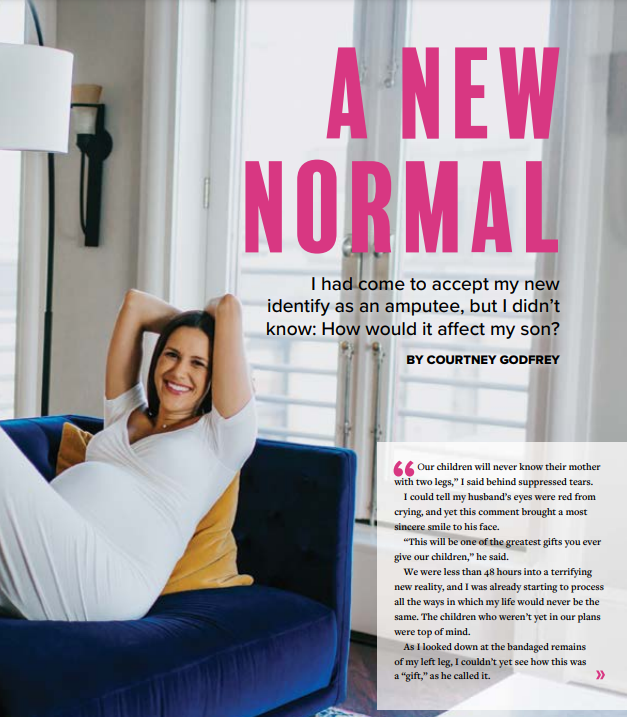Our children will never know their mother with two legs,” I said behind suppressed tears.
I could tell my husband’s eyes were red from crying, and yet this comment brought a most sincere smile to his face.
“This will be one of the greatest gifts you ever give our children,” he said.
We were less than 48 hours into a terrifying new reality, and I was already starting to process all the ways in which my life would never be the same. The children who weren’t yet in our plans were top of mind.
As I looked down at the bandaged remains of my left leg, I couldn’t yet see how this was a “gift,” as he called it.

A boat propeller, in a shocking accident on a Minnesota lake, had sliced through my foot in a way that left little to salvage below the knee.
The doctors were optimistic when they delivered the news: I would be an amputee, they told me, but prosthetic technology would allow me to live a normal life.
Learning to walk again was frustrating and painful, and so was the way I was looked at by society.
The stares were undeniable and it cut like a knife.
Even worse than watching adults avert their eyes in shame — once I caught them looking — was the way they tried to extinguish their children’s raging curiosity when they caught sight of me.
I remember one of the first times I was brave enough to go shopping on my own. I was making my way down the aisles of Target in one of those motorized scooters when I saw a pair of young boys fixated on my leg.
I didn’t need to hear what they said to their mother; her look of desperation to distract their attention away from me was a reaction I saw all too often from parents.
I scooted closer.
“Pretty different to see a metal leg, huh?” I prompted. “Do you have any questions?”
One of the boys shook his head “no,” as they both clung tighter to their mother’s hip.
Content with their decision, I made my way to the next aisle and continued with my shopping. Only a moment had passed when I saw the boys pop their heads around the corner.
Timidly, they started toward me — their mom in tow.
“Did you want to ask her something?” their mother asked them.
“How does it work?” the one started.
We had a short but nice chat, and when they were satisfied, they continued on their way.
The same mom who only minutes earlier looked horrified over her children’s curiosity was now thanking me.
In my more than two years as an amputee (the accident in was in 2017), I’ve had many interactions like this.
Parents are so embarrassed — when their children loudly voice their curiosity over my physical difference — that they just want to run away. But they’re missing a wonderful opportunity to normalize disabilities.
I was thumbing through social media recently when I came across a post about this exact topic. The author’s advice was to take your child’s focus away from the disability to normalize the situation and put the focus on the person’s humanity and similarities to everyone else.
For example, if your child asks, “Why is that man in a wheelchair?”, a great response would be, “So he can go to the store like us. Do you like to go to the store?”
Depending on their age, children may continue their line of questioning, but by diverting attention away from the disability in your answers, the author argued, you can nurture a truly inclusive mindset.

In the past, when friends and coworkers asked for my advice about how to respond to their children’s questioning, I encouraged them to introduce themselves to the person.
For example, “My son/daughter was just admiring your cool leg/wheelchair. I hope it’s OK that we came and said hello.”
Most of the time, the individual will not only engage with your child, but they will also be appreciative of your initiative and — frankly — that you treated them like a normal human being.
I’ve lately wondered how I would react if I was in their situation, if my accident had never happened and I was a mother with two legs with no understanding of what it was like to live with a disability.
Would I naively assume the individual didn’t see my child point from across the room? (They did, by the way.) Would I choose a private conversation in the car instead of an introduction? Would I scold my children for their innocent curiosity?
I fear the answer to all those questions would be yes.
When we first saw our baby on the ultrasound — his tiny little arms and legs bouncing around on the screen — those fears I had in the hospital came flooding back.
I’d become really good at normalizing my disability through conversations with children, but what would happen when they were my son’s classmates?
With great angst, I anticipated the day when another child asks him about his mother’s leg and why she looks different. I could already feel his confusion and embarrassment.
I worried about the bully on the play- ground, who would take an interest in his mother’s unique physical appearance. And ultimately, I worried how all this would shape him. Would it make him defensive and angry or sensitive and confident?

Like most parents, I want my child to have the most normal upbringing possible. But even as I type this, I wonder what “normal” truly means. Maybe my limb difference will be so normal to my son that it won’t affect him at all. Or maybe, it will be the “greatest gift,” just as my husband said it would be.
My son is too young now to know that I’m different, but I anticipate the day when he looks at my prosthetic and asks, “What’s that?”
I look forward to showing him that his mom is just as strong, just as confident and just as able as the other moms. Most important, I look forward to showing him that love and beauty transcend physical abilities.
I surfaced from the water that day and I survived that accident — not so I could be a voice, a mentor and an advocate for others living with limb loss. That’s just a bonus.
I survived that accident so I could be Callan’s mommy.
One leg or two, I’m the most qualified person for the job, and I can’t wait for the day when that kid in Target is my own.
STUDY UP
Follow these six easy tips when talking to kids about disabilities:
· It’s OK to notice.
· Use respectful terminology.
· Emphasize similarities.
· Teach understanding and empathy.
· Address bullying.
· Treat devices with respect.
For more info, visit: tinyurl.com/not-so-different
Courtney Godfrey is a reporter with Fox 9 in the Twin Cities.
Pregnancy portraits by Sarah Karnas Photography.
Family and baby portraits by Rachel Resch Photography



















